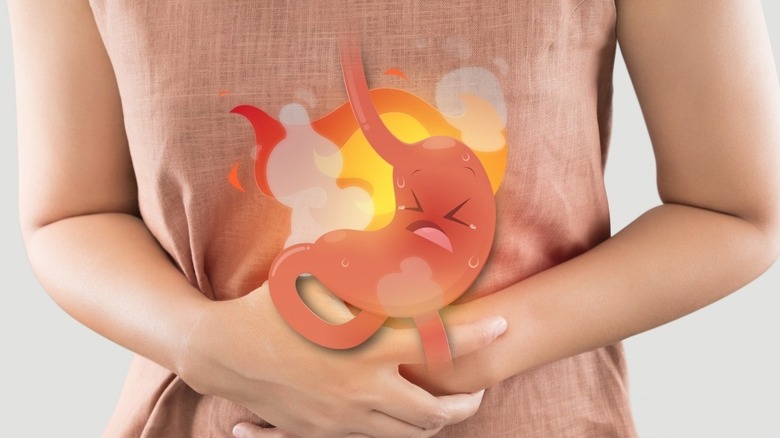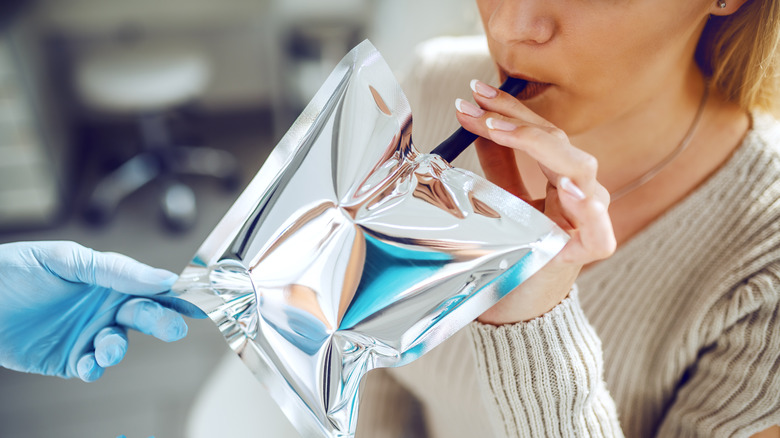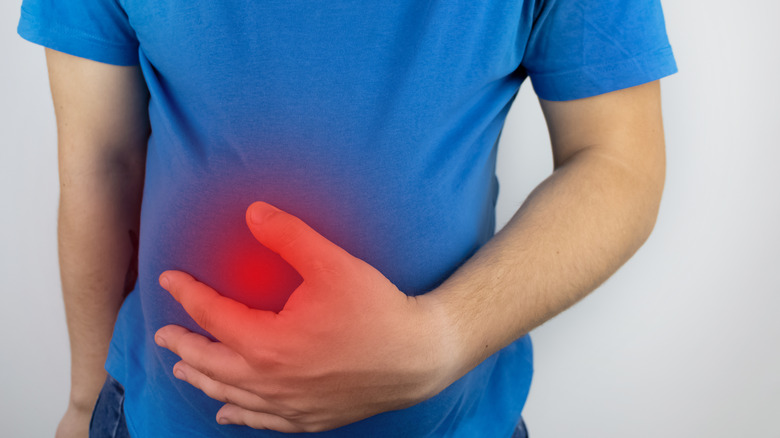Stomach Ulcers Explained: Causes, Symptoms, And Treatments
Your stomach produces acid that helps break down everything you eat. This acid is strong enough to erode bones and teeth, with a pH level of 1 to 2, which qualifies as strongly acidic (per Healthline). Growth factors, prostaglandins, mucous, and an ample blood supply protects your stomach's lining from acid damage (via Gastric Ulcer). If these defenses are compromised, you could get ulcers.
The American College of Gastroenterology describes ulcers as open sores. Gastric ulcers, which are located in the stomach, are one of two types of peptic ulcers (ulcers caused by acid). The other type of peptic ulcers are duodenal ulcers, which are found in the first part of the small intestine. Ulcers aren't restricted to the digestive system, however. They also appear in veins, arteries, the mouth, and genitals (via Healthline).
One study published in BMJ Gastroenterology estimates that there were about 8.09 million people with peptic ulcers in 2019. Luckily, stomach ulcers are treatable, and there are certain preventative measures you can take to reduce your risk of developing one (via Healthline).
Symptoms of stomach ulcers
Pain between the belly button and breastbone is the most common symptom of peptic ulcers, according to the National Institute of Diabetes and Digestive and Kidney Diseases (NIDDK). This pain might feel dull or burning, and will be felt on and off for days or even longer periods. When the pain comes, it usually stays for minutes to hours. Medscape notes that stomach ulcer pain may start soon after meals, while duodenal ulcer pain may start 2-3 hours after meals. Eating or taking antacids relieves the pain of duodenal ulcers but may offer little relief for stomach ulcers.
Healthline outlines other symptoms of stomach ulcers: heartburn, acid reflux, bloating, nausea, vomit that may be bloody, blackish poop, fear of eating, weight loss, and anemia. Stomach ulcer and gastritis (another gut problem) have similar symptoms, but you can tell stomach ulcers apart since you will likely feel a stomach ulcer pain from one spot, says the Cleveland Clinic. You can also differentiate a stomach ulcer pain from heartburn because heartburn is usually felt in the chest. However, the only way to be certain that you have a stomach ulcer is to have your doctor diagnose it.
What causes stomach ulcers?
Stomach ulcers are mostly caused by a Helicobacter pylori (H. pylori) infection or by taking non-steroidal anti-inflammatory drugs (NSAIDs) in large doses or for a long time (per NHS Inform). H. pylori infections are common, but most people don't show symptoms (via Acta Biomedica). How the bacteria infect the stomach is uncertain. It could be through contaminated water, food, saliva, vomit, or stool. Hence, good hygiene — washing hands, brushing teeth, not sharing cutlery — can help people avoid infection. When H. pylori enters the stomach, it multiplies and damages the stomach's tissue, says the Cleveland Clinic. This leaves the stomach vulnerable to ulceration by acid.
NSAIDs are popular pain relievers used for arthritis, menstrual cramps, tooth aches, and other conditions (via Cleveland Clinic). Ibuprofen, aspirin, and Naproxen sodium are commonly found NSAIDs. This class of drugs relieves pain by blocking the production of prostaglandins. This weakens the stomach's defense against acid, since prostaglandins protect the stomach's lining, explains MedicineNet. Because of this, WebMD advises peptic ulcer patients to opt for acetaminophen instead of an NSAID. And NSAIDs shouldn't be taken for more than three days in a row for fever or 10 days for pain (per Cleveland Clinic).
Zollinger-Ellison syndrome, a rare condition caused by a tumor, also causes stomach ulcers (per Medical News Today). This tumor usually forms in the pancreas or small intestine and produces gastrin, which increases acid in the gut. This excess acid in turn can cause ulcers.
What makes ulcers flare up?
There are some things that make ulcer symptoms worse. It's worth knowing what they are even if everyone responds to them differently. If you have an ulcer, you may have noticed that some foods make ulcers flare up. WebMD reports that fatty foods, acidic foods like citrus and tomatoes, chocolate, spicy foods, alcohol, and caffeine worsen ulcers in some people. Livestrong notes that how coffee affects ulcers depends on your tolerance and the type of coffee you drink. According to the American Addiction Centers, drinking alcohol increases your risk of developing peptic ulcers and worsens ulcers. They advise that you cut down on drinking too much if you have a peptic ulcer.
According to a research review published in the International Journal of Molecular Medicine, smoking increases your risk of getting a H. pylori infection. Smoking also reduces mucus production, increases stomach acid, causes reflux from the duodenum, and makes ulcers difficult to heal.
Stress is often associated with ulcer flare-ups. When the body responds to stress, it increases the stomach's acid, as gastroenterologist Christine Lee told the Cleveland Clinic. Stress also increases the urge to drink and smoke, and people who are stressed are more likely to use NSAIDs to treat aches or pain, Dr. Lee notes. Further, stress reduces the body's healing abilities, according to gastroenterologist Dr. Tara Menon, speaking to the U.S. News & World Report. She adds that managing stress may help to reduce ulcer symptoms like heartburn or reflux, as well as to improve health generally.
Prevention of stomach ulcers
There are certain measures you can take to avoid stomach ulcers. People at an elevated risk for developing ulcers — including those over age 70, people who've previously had ulcers, and those who are frequent users of NSAIDs — may want to take particular care to follow these guidelines. Basically: Preventing stomach ulcers involves limiting the use of NSAIDs, preventing H. pylori infection, and protecting your stomach's lining.
If you take pain relievers regularly, the Cleveland Clinic advises that you ask your doctor to prescribe alternatives to NSAIDs. And if you must take NSAIDs, then your doctor should prescribe the lowest possible dose and discuss ways to protect your stomach. The site also advises that you drink in moderation and quit smoking. Johns Hopkins Medicine advises that you practice good hygiene to prevent a H. pylori infection. This includes washing your hands, particularly before mealtimes and after you use the bathroom, and making sure your food and water are clean and safe.
Diagnosing a stomach ulcer
To get a diagnosis of stomach ulcer, you need to visit your doctor. Your doctor will ask you to describe your symptoms, including how often you feel them and when they happen (via Medical News Today). To confirm if you have an ulcer, the type of ulcer, and its cause, your doctor will run further tests.
One of these tests is a barium swallow. You will need to drink liquid barium, which will coat the organs of your gut so they can be seen by an X-ray (via Johns Hopkins Medicine). Another test is an upper endoscopy. An endoscope with a camera is inserted in your mouth and is directed through your digestive tract to your duodenum to check for ulcers. A tissue sample can also be taken for a H. pylori lab test using this method.
In addition to getting tissue samples through endoscopy, the Mayo Clinic points out that stool and breath tests can be used to check for H. pylori infection. Stool tests are used to check for H. pylori or its antigen. To perform a breath test, you will swallow tagged carbon molecules — if these encounter H. pylori in your gut, it will cause carbon to be released into your body, which will then need to be breathed out. You will exhale into a bag, and a device will detect the amount of tagged carbon molecules your breath contains.
Treating a stomach ulcer
Before taking action to combat your ulcer, you should make an appointment with your doctor (via WebMD). The goal of ulcer treatment is to reduce acid, protect the gut from acid, and to clear out infections — and in many cases, this will require professional treatment.
WebMD advises that you don't treat ulcers yourself with antacids, as they only ease ulcer pains temporarily but don't cure the underlying cause. For ulcers caused by NSAIDs, the NIDDK recommends the prescription of proton pump inhibitors like omeprazole and histamine receptor blockers like cimetidine because they reduce stomach acid. The drug sucralfate can be used to shield ulcers from acids as they heal. For ulcers caused by H. pylori, a doctor may prescribe a combination of antibiotics, along with a proton pump inhibitor to reduce your stomach acid temporarily.
Surgery to treat ulcers is no longer common now that doctors are aware of and able to treat the underlying causes of ulcers (via Patient). However, in cases where surgery is necessary — like when the stomach lining is perforated due to an ulcer — the procedure is now typically laparoscopic.
Can stomach ulcers be cured permanently?
According to Harvard Health Publishing, most stomach ulcers that are not complicated take two to three months to heal completely. The NIDDK recommends that you take any prescription drugs, especially antibiotics, as your doctor instructs. Your ulcer could reoccur if an H. pylori infection is not completely treated. If the ulcer was caused by NSAID use, you should discontinue taking it until your ulcer heals.
Sometimes, peptic ulcers don't heal even after treatment. Ulcers that don't heal after eight to 12 weeks of treatment are described as refractory, according to a paper published in Clinical Endoscopy. Refractory ulcers are treated by increasing the dose of drugs or by using different drugs. According to the Mayo Clinic, refractory ulcers are caused by smoking, continuing the use of NSAIDs, not taking ulcer medications properly, or if H. pylori is resistant to antibiotics. Less common causes of refractory ulcers are Zollinger-Ellison syndrome, another infection apart from that of H. pylori, and diseases like stomach cancer and Crohn's disease (per Clinical Endoscopy).
Stomach ulcer complications
If peptic ulcers aren't treated, they can cause complications like bleeding, perforation, blockage of the stomach, and stomach cancer (via Mayo Clinic). These complications may appear even if your ulcer has no symptoms, which is common for older people and people who frequently use NSAIDs, stresses UpToDate.
Bleeding is the most common complication of peptic ulcers. Symptoms of a bleeding ulcer include vomiting blood or coffee-ground-looking materials, or if your poop is black or bloody (per MSD Manuals). You might also faint, feel thirsty, sweat, or feel weak because of blood loss.
Perforated ulcers are ulcers that have eaten through the walls of the stomach. Perforated ulcers are characterized by an intense pain that may be felt in other parts of the torso. If ulcers perforate, bacteria from the gut can infect the abdominal cavity and cause peritonitis. Bacteria could also spread to the rest of the body and cause sepsis (via Cleveland Clinic).
Ulcers at the junction between the stomach and duodenum could block the passage of food to the small intestine if they form scars that are big enough. Stomach ulcers could also lead to cancer, especially if the ulcer is caused by H. pylori.
Natural remedies for stomach ulcers
According to a research review from the Brazilian Archives of Digestive Surgery, eating fiber-rich foods like apples, oatmeal, granola seeds, flaxseed, pears, and whole grains helps food pass through the digestive system fast, and reduces bloating and abdominal pain from eating. Additionally, Healthline notes that foods like cabbage and honey have antioxidant abilities that help prevent and heal ulcers; dried licorice (not licorice-flavored candies) and honey help increase mucus; and garlic and mastic have antibacterial properties that can help fight against H. pylori infection.
Apart from food, other natural remedies are also effective to some extent. Sepalika identifies five essential oils effective against H. pylori infection based on a study published in Antimicrobial Agents and Chemotherapy. They include lemon grass, carrot seed, clove, cinnamon bark and manuka essential oils. Also, Dr. Samuel Meyers told Prevention that water dilutes stomach acid, so drinking a full glass of water can help ease discomfort.
According to the National Center for Complementary and Integrative Health, supplements and herbs may affect drugs you are taking and may be compromised during their manufacture. So, you should discuss any remedy you want to use with your doctor.
Exercising with stomach ulcers
The World Health Organization recommends that adults perform at least 150 minutes of moderate exercise or 75 minutes of vigorous exercise for overall health and wellbeing. But ulcer patients may experience pain and feel unwilling to exercise.
The Canadian Society of Internal Research acknowledges that exercising with gut problems can be tricky. Intense exercise could cause heartburn, nausea, diarrhea, and gut bleeding. But moderate exercise could be beneficial to the gut, they explain. According to research published in Sports Medicine, exercising reduces stomach acid and improves immunity, which could reduce the risk of developing H. pylori infections. Moderate exercise also reduces anxiety, smoking, and drinking, and helps you adopt a healthier lifestyle.
As for what exercises you can do when you have a stomach ulcer, Livestrong suggests cardio exercises (swimming, dancing, brisk walking), stress relief exercises (yoga, Pilates), and strength training exercises (though be cautious with core-strengthening exercises, and discontinue them if you feel any pain). It's safe to exercise if you have a stomach ulcer, but let your doctor know what exercises you perform and if your symptoms worsen during your workout.
How stomach ulcers affect your quality of life
Stomach ulcers may take several weeks to heal, so they may be an inconvenience during this time (via Familydoctor.org). One thing stomach ulcers can affect is your eating habits, and it can be frustrating to find that your favorite meal triggers your ulcer. News Medical advises that you keep a food journal to document potential trigger foods and the symptoms you feel. They also advise that you eat more smaller meals, eat at a slower pace, sit upright as you eat and after eating, and don't eat within two hours of bedtime.
Ulcer irritations can interrupt your sleep. According to Medscape, 30–40% of stomach ulcer patients wake up with ulcer pains at night. V Cure notes that gravity and pressure on your gut while you sleep can make ulcers feel worse at night. They advise that you avoid lying on your stomach, and instead lie on your back or left side to move acid away from your ulcer.
When to see a doctor
If you experience symptoms of peptic ulcers such as abdominal pain, nausea, vomiting, or heartburn, you should let your doctor know so they can determine if you may have an ulcer (via Prevention). Leaving these symptoms unchecked could lead to further complications. You should let your doctor know if you want to get a H. pylori test. Your doctor will evaluate you before administering this test, since not everyone needs it (per Harvard Health Publishing).
If you have an ulcer, you should contact your doctor immediately if you experience symptoms of a complicated ulcer (via National Health Service). These symptoms include a sudden, intense pain in your stomach that keeps getting worse, black-ish and sticky poop, or you have vomit that contains blood or a substance that resembles coffee grounds.
You should also let your doctor know if you have any unbearable side effects of ulcer medications, or if you feel your drugs aren't working (via NIDDK). Your antibiotic may not be able to destroy H. pylori that has become resistant to antibiotics. Also, antacids may prevent antibiotics from working. If your treatment doesn't cure ulcer, your doctor will increase the dose or change it.
Busting ulcer myths
There are many myths surrounding ulcers. The most common myth is that peptic ulcers are caused by stress. According to Famous Scientists, ulcers were believed to be caused by stress up to the 1980s. Prior to this time, scientists commonly believed that bacteria could not the culprit behind ulcers, because they thought stomach acids would kill harmful pathogens — a misconception proven wrong by scientists Barry Marshall and Robin Warren, who found that ulcers could be caused by Helicobacter pylori. To prove the point, Marshall chugged a beaker full of H. pylori and was diagnosed with peptic ulcer. It's now acknowledged that everyday mental and psychological stress only worsens ulcer symptoms, and cannot itself cause an ulcer (via Healthline).
Ulcers have also been linked to food. But The American College of Gastroenterology says that spicy foods don't cause ulcers, and may only irritate them. They add that you also don't need to follow a bland diet to manage ulcers. Another myth is that taking milk eases ulcer pain. But the Cleveland Clinic states that drinking milk only soothes ulcer pain for a while, and might ultimately make pain worse by provoking an increase in stomach acid. Finally, peptic ulcer isn't a lifetime disease. In the past, ulcers couldn't be treated and people suffered for months or a lifetime. But that's not the case anymore, as ulcers can be treated and cured (via Nemours KidsHealth).














